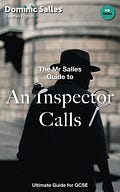The inspector is relevant to every question, and Act 3 gives you most bang for your buck, because he gives such a detailed speech, packed with messages.
This is an extract from my guide:
Conservative Versus Labour
When the Inspector says, “I haven’t much time”, the words make no sense in context – a real police investigation would not require this urgency. This suggests his supernatural powers – he somehow knows that Gerald will expose him as not the real inspector, or he knows that the death of Eva is still pending, contingent on them being able to “divide the responsibility between” them.
However, to the audience at this moment in the play The Inspector’s words will appear as very odd. Because they make no sense in the mouth of a real detective, they introduce a new level of suspense. They mean that, when Gerald returns, we are much more likely to believe that he was in fact “a hoax”. It also introduces a note of desperation to The Inspector. Remember that historically Priestley, like nearly everyone else in the country, did not expect the country to vote for a Labour government. He is more desperate because he knows how unlikely this is. This desperation is reflected in The Inspector’s final words.
Is there a sense of desperation when he says to them “But each of you helped to kill her…Remember…Remember…Remember what you did”? Does he already suspect, not just that they won’t feel guilty, but that they will actually forget what part they played entirely? This is akin to the country forgetting about the deaths of World War One. It is also like what he fears, the country ignoring the deaths of World War Two.
In order to remind his audience of these deaths, before he leaves, The Inspector suggests that he already knows war is coming and that Eric will die in it: “And now she’ll make you pay a heavier price still” can only mean that Eric’s death is the price the Birling parents will pay.
The Inspector’s Last Words
The Inspector uses biblical language, “We are members of one body”, which you remember comes from the Anglican communion, and helps Priestley’s audience equate The Inspector’s socialist message with Jesus’ Christian message. “We are responsible for each other” is the next part of the speech – the socialist message grafted directly on to the Christian one. By allying the language of the church to the language of socialism, he suggests that socialism is a moral duty, almost a religious duty.
Because he realises that Britain is still a patriarchal society in 1945, though less so now than in 1912 (because in 1945 women can vote) he warns “if men will not learn that lesson”. This emphasis on “men” asks all the women in the audience to seize power through their vote, in contrast to the “men” who have led them to two world wars: “then they will be taught it in fire and blood and anguish.”
Here Priestley is being didactic. However, because The Inspector is speaking in 1912, we understand that his powers are supernatural – he has foreseen the wars that the audience have lived through. It is another way in which Priestley hints at The Inspector’s supernatural powers.
Priestley decides that Sheila should make this connection. Eric points out that The Inspector first arrived when Birling was attacking social responsibility, and socialists as “cranks”. But only Sheila appreciates the supernatural significance of this: “Sheila: (sharply attentive) Is that when The Inspector came, just after father had said that?... It's queer – very queer … was he really a police inspector?”
He contrasts this with Birling’s reaction about The Inspector, “Probably a socialist or some sort of crank”. Birling’s judgment has been fatally undermined at the beginning with his pronouncements on war and The Titanic. So, Priestley implies that Birling is correct in deciding that The Inspector is “a socialist” but wrong to dismiss this as “a crank”. In this way he invites his audience to think again about socialists and voting Labour.
The final words spoken about him are again from Sheila. She proves that it makes no difference that there may have been five different girls, and it makes no difference if none of them committed suicide. What matters is “you began to learn something”.
In this way Priestley shows that The Inspector’s most important role has been that of a teacher. Her final words about him repeat his final words, “Fire and blood and anguish”. This is crucial to Priestley, because it tells his audience that his socialist message won’t just save the “millions” of “John Smiths” and “Eva Smiths” from exploitation, it will save them from future wars.
Good v Evil
A didactic morality play would keep The Inspector on the stage to teach his lesson right up to the end. Similarly, so would a detective, Whodunit play, where The Inspector would reveal everything at the end.
Again, it is very interesting that Priestley rejects both these conventions of the two genres he has borrowed from. He also rejects the tidy, happy-ever-after resolution of A Christmas Carol. Why?
One possibility is that he is making a point about real life. His audience, who have just seen millions killed in The Second World War, are not so likely to believe in happy endings. With hundreds of thousands of soldiers returning from war, he knows they are also likely to have killed fellow men, even women and children. The binary good versus evil structure of a morality play would also not feel anything like real life. Consequently, Priestley deliberately leaves us with ambiguity – are Gerald and Eric more good than evil? Will Sheila’s sense of injustice last?
For more grade 9 interpretations of the inspector’s role, consider becoming a paid subscriber.
Keep reading with a 7-day free trial
Subscribe to Mr Salles Teaches English to keep reading this post and get 7 days of free access to the full post archives.


